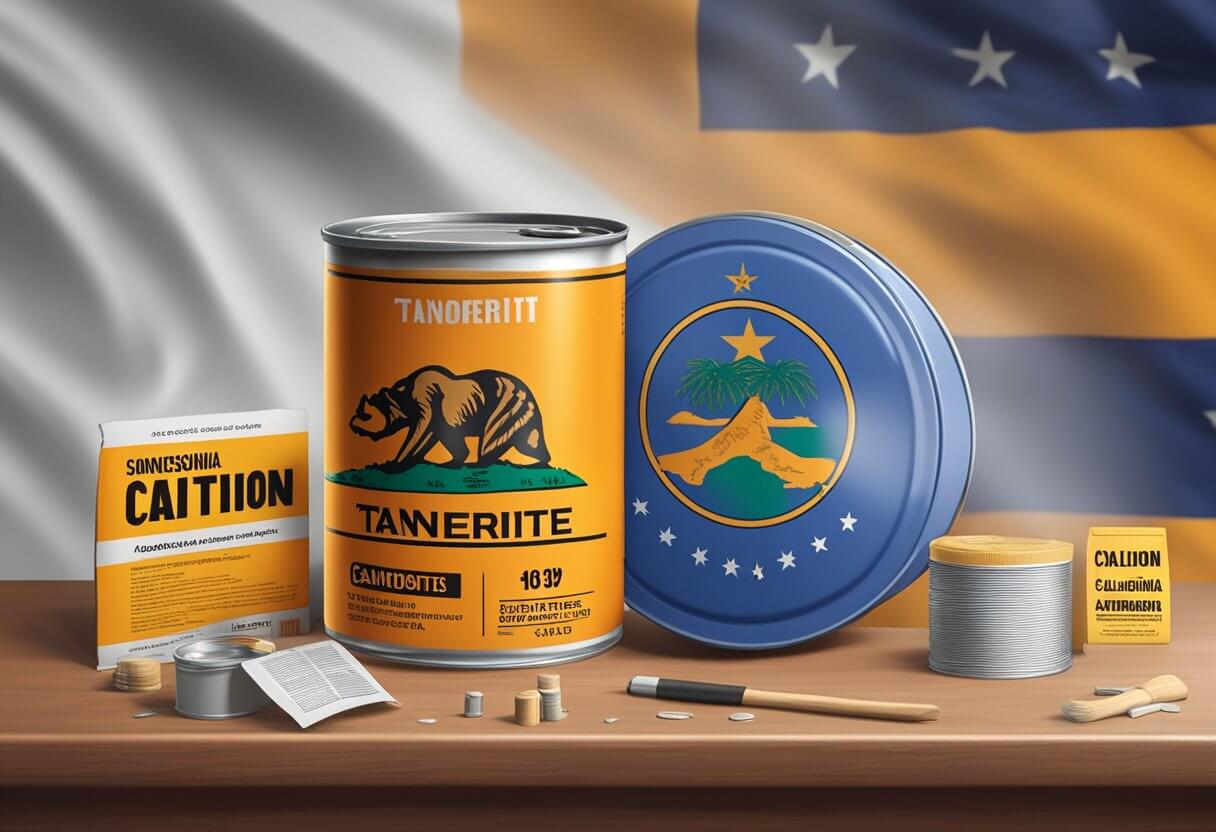Is Tannerite Legal in California? The Complete Guide

Tannerite is a brand of explosive targets designed for firearms practice. It’s a binary compound made of ammonium nitrate and aluminum powder, which becomes explosive when mixed together. The legality of Tannerite in California is a subject of debate and strict regulations. In this comprehensive guide, we’ll explore the legal status of Tannerite in California, existing laws and regulations, permit requirements, potential penalties, safety concerns, and responsible use guidelines.
What is Tannerite?
Tannerite is a popular explosive target used for firearms practice, particularly long-range shooting. It’s a binary compound, meaning it consists of two separate components: ammonium nitrate and aluminum powder. When these components are mixed together, they form an explosive material that detonates upon impact from a high-velocity bullet.
The separate components of Tannerite are not considered explosives until they’re combined. This unique feature allows Tannerite to be sold and transported without the stringent regulations typically associated with explosives.
Tannerite is designed to provide a visible and audible reaction when hit by a high-speed bullet, making it useful for target practice and shooting range applications. The explosion produces a loud bang and a puff of smoke, allowing shooters to confirm their hits and adjust their aim accordingly.
The Legal Status of Tannerite in California

Existing Laws and Regulations
In the United States, Tannerite is not regulated at the federal level by the Bureau of Alcohol, Tobacco, Firearms, and Explosives (ATF) because its components are sold separately and are not considered explosives until combined. However, several states have implemented their own laws and regulations regarding the possession and use of Tannerite.
California and Maryland are currently the only two states that have passed laws prohibiting the purchase, use, or carrying of Tannerite and other explosive materials without an explosives license.
Permit Requirements
In California, individuals are required to obtain a valid permit or license to legally possess, use, or carry Tannerite, even in its unmixed form. The permit requirement applies to both the individual components and the combined explosive mixture.
The process of obtaining a permit or license for Tannerite in California involves submitting an application, undergoing background checks, and meeting specific requirements set forth by the state’s regulatory agencies.
Penalties for Illegal Possession or Use
Violating California’s laws regarding Tannerite can result in significant penalties. According to the California Penal Code, possessing any substance or combination of substances with the intent to make a destructive device or explosive without a valid permit is considered a felony offense.
Individuals convicted of illegally possessing or using Tannerite in California can face imprisonment for up to four years, along with substantial fines. Additionally, any property damage or personal injury caused by the illegal use of Tannerite may result in civil lawsuits and further legal consequences.
Controversy Surrounding Tannerite
Safety Concerns
While Tannerite is designed to be used safely for target practice, its explosive nature has raised safety concerns among authorities and communities. Improper use or handling of Tannerite can potentially lead to fires, property damage, and personal injury.
Incidents involving Tannerite explosions have been reported, with some resulting in significant damage to surrounding structures and properties. Additionally, the loud detonations can startle nearby residents and potentially cause distress or trauma.
Environmental Impact
The use of Tannerite in sensitive or protected natural areas has raised concerns about its potential environmental impact. The explosions can disrupt wildlife habitats, disturb vegetation, and potentially cause soil erosion or contamination.
Certain states and local jurisdictions have implemented regulations or restrictions on the use of Tannerite in specific areas to minimize its environmental impact.
Misuse and Accidents
Unfortunately, Tannerite has been misused for purposes beyond target practice, such as gender reveal parties or other ill-advised stunts. These misuses have resulted in numerous accidents, property damage, and personal injuries.
One notable incident occurred in New Hampshire, where a family used 80 pounds of Tannerite for a gender reveal party, causing an explosion that cracked the foundations of surrounding homes.
Alternatives to Tannerite
For those seeking safer or legal alternatives to Tannerite for target practice or other applications, several options are available:
- Reactive Targets: Some companies offer non-explosive reactive targets that produce a visible reaction when hit, without the risk of an explosion.
- Marking Ammunition: Specialized marking ammunition, such as paint-filled or chalk rounds, can provide visual feedback on target impacts without the need for explosive targets.
- Electronic Target Systems: Advanced electronic target systems use sensors and software to detect and record hits, providing real-time feedback and eliminating the need for explosive targets.
- Traditional Paper or Steel Targets: Classic paper or steel targets remain a safe and cost-effective option for target practice, although they may not provide the same level of visual and audible feedback as explosive targets.
When considering alternatives, it’s essential to weigh the benefits and drawbacks of each option, taking into account factors such as cost, availability, and personal preferences.
Tips for Responsible Tannerite Use (if legal)
If you plan to use Tannerite in a jurisdiction where it is legal and you have obtained the necessary permits or licenses, it’s crucial to prioritize safety and responsible use. Here are some tips to consider:
- Follow All Laws and Regulations: Thoroughly research and comply with all applicable federal, state, and local laws and regulations regarding the possession, transportation, and use of Tannerite.
- Choose a Safe Location: Select a remote and clear area away from structures, people, and flammable materials for detonating Tannerite targets.
- Proper Storage and Handling: Store the separate components of Tannerite securely and mix them only when ready for immediate use. Follow all safety instructions provided by the manufacturer.
- Adhere to Safety Protocols: Use appropriate personal protective equipment, such as ear and eye protection, and maintain a safe distance from the detonation site.
- Respect the Environment: Avoid using Tannerite in environmentally sensitive areas and properly dispose of any debris or residue after detonation.
- Obtain Necessary Permits or Licenses: Ensure you have obtained all required permits or licenses before possessing or using Tannerite.
Remember, the responsible and legal use of Tannerite is paramount to ensure the safety of yourself, others, and the environment.
Conclusion
The legality of Tannerite in California is a complex issue governed by strict regulations. As an explosive material, Tannerite’s possession and use are subject to specific permit requirements and penalties for violations.
In California, individuals must obtain a valid permit or license to legally possess, use, or carry Tannerite, even in its unmixed form. Failure to comply with these regulations can result in felony charges and significant penalties, including imprisonment and fines.
While Tannerite is a popular choice for target practice, its explosive nature has raised safety concerns and sparked debates about its environmental impact and potential for misuse. As such, it’s crucial to prioritize responsible use, follow all applicable laws and regulations, and consider safer alternatives when appropriate.
By understanding the legal status of Tannerite in California and adhering to best practices, responsible individuals can enjoy target practice while minimizing risks to themselves, others, and the environment.



![Are AR Pistols Legal in California? [Definitive 2024 Guide] 6 Are AR Pistols Legal in California? [Definitive 2024 Guide]](https://legalinformers.com/wp-content/uploads/2024/03/are-ar-pistols-legal-in-california-768x525.jpg)


